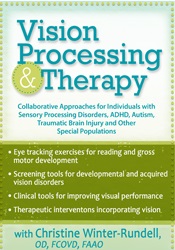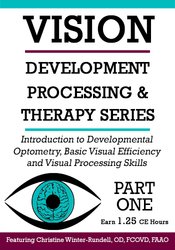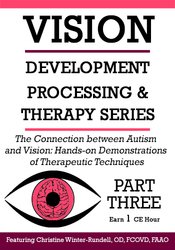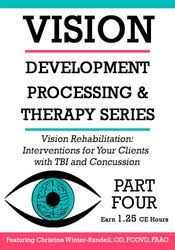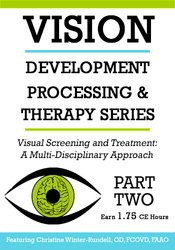What You’ll Discover in Christine Winter-Rundell Vision Processing & Therapy Collaborative Approaches for Individuals with Sensory Processing Disorders, ADHD, Autism, Traumatic Brain Injury & Other Special Populations
- Faculty:
- Christine Winter-Rundell
- Duration:
- Full Day
- Format:
- Audio and Video
- Copyright:
- April 27, 2016
Description
- Eye tracking exercises for Gross motor development and reading
- Screening tools for Acquired and developmental vision disorders
- Clinical tools for improving visual performance
- Vision therapy in therapeutic interventions
In this seminar you will learn how to recognize and understand the specifics of how vision processing relates to disorders you treat in clinical practice daily, such as: sensory processing disorders, autism, ADHD, and traumatic brain injury.
What you will learn is:
- The steps required to properly screen for potential vision deficits
- How to recognize various visual disorders
- Educate your patients and their families about how vision can affect learning, behavior, and function
- Collaboration on effective treatments and therapeutic vision interventions.
Experience the different methods of communication. for Enhance and strengthen abnormal visual skills. Discover new ways to improve your vision. for Effective screening for Common visual disorders and walking away with These clinical tools can help you improve your patient outcomes and expand your knowledge.
OUTLINE
Traditional vs. the Developmental Model Vision
- Vision It is a dynamic process
Visual System Brokendown
- Refractive and ocular conditions
- Functional and perceptual skills
Visual Efficiency Skills
- Neurodevelopment of eye movements. Accommodation and binocularity.
- Amblyopia, Strabismus and Early Intervention
Visual Processing
- Vision Neurodevelopmental disorders can cause problems
- Vision problems as sensory processing disorders
- Visual perceptual tests: Standardized and observational
Multimodal Treatment-Disciplinary Approach
- Establishing the foundation for good visual development
- Motor activities and vestibular activity are crucial
- Collaboration between therapeutic interventions, and/or learning strategies
- Optometric applications of lenses and prisms
Neuroplasticity in the Visual System
- Early intervention
- Is there an age where it’s too late? for intervention?
- Sue Barry, Fixing My Gaze & vision therapy
- Jillian’s story
- Brain Injury and concussion
VisionLearning and Behavior
- Undiagnosed and untreated vision problems: Signs and symptoms
- Red flags for autism spectrum disorder
- Vision problems versus behavior problems
Screening Procedures and Hands-Demonstration
- PLRG The penlight red/green
- Screening for standardized convergence insufficiency
- Visual tracking, head movements and the midline plan
- You can find a developmental optometrist close to you with InfantSEE
Therapeutic Activities for Hands-Demonstration
- Visual-Integration activities for the vestibular system
- Eye tracking exercises for Gross motor development and reading skills
- Eye teaming and the importance convergence
- Visual perceptual enhancement games
- Activities for bilateral integration
OBJECTIVES
- You can distinguish between the developmental and traditional vision models.
- Identify the systems of vision that impact learning.
- Discuss the visual complications of neurologic disorders.
- Discuss the role vision plays in early intervention.
- How to screen for vision disorders.
- Collaboration in therapeutic interventions for Vision problems
- Summarize direct treatment strategies as well as home programming ideas.
Satisfaction Guarantee
We guarantee your satisfaction. PESI, Inc. PO Box 1000 Eau Claire WI 54702-1000, or call 1-800-844-8260.
ADA requirements
PESI will gladly accommodate your ADA needs. Please call our Customer Service Department for For more information, please visit 800-844-8260.
Handouts
| Webcast Manual (4.46 MB) | 86 Pages | Available after Purchase |
Faculty

Christine Winter-RundellOD, FCOVD and FAAO Similar seminars and products 8
Christine Winter-Rundell, OD, FCOVD, FAAO, is a Fellow of the American Academy of Optometry and a Fellow of the College of Optometrists in Vision Development (COVD). Her main interests are in primary eye care for All ages of children are welcome with A special focus on children with vision-related learning disorders or any patients who have had a brain injury. She is a co-author.-managing patients with Other professionals and works closely with occupational, physical, and speech therapists, psychologists, and pediatricians. Dr. Winter-Rundell Graduation with Honors with a degree in Biology and minor in Psychology from the University of Iowa in 2000. She attended Southern College of Optometry in Memphis, TN for her Doctor of Optometry education, followed by a Residency at Nova Southeastern College of Optometry in the area Primary Eye Care with emphasis in Pediatrics. In 2005 she joined The Children’s Eye Center at Cedar Rapids Eye Care. Dr. Winter has been very active in optometric service missions to five different countries in Latin America where her Spanish language fluency was advantageous, and looks forward to sharing that experience with her children.
Disclosures to Speakers:
Financial: Dr. Christine Winter-Rundell is employed by The Children’s Eye Center at Cedar Rapids Eye Care. PESI, Inc. gives her a speaking honourarium.
Non-Financial: Dr. Christine Winter-Rundell Has no pertinent non-financialOnline viewing and digital downloadingrelationship to disclose.
| Online Viewing or Digital Download | Christine Winter-Rundell – Vision Processing & Therapy – Collaborative Approaches for Individuals with Sensory Processing Disorders, ADHD, Autism, Traumatic Brain Injury & Other Special Populations
IMPORTANT: This is it. “Christine Winter-Rundell – Vision Processing & Therapy – Collaborative Approaches for Individuals with Sensory Processing Disorders, ADHD, Autism, Traumatic Brain Injury & Other Special Populations” It is totally Downloadable Available In your account
(If a link is not working, we will quickly renew it.
Your patience is greatly appreciated.

